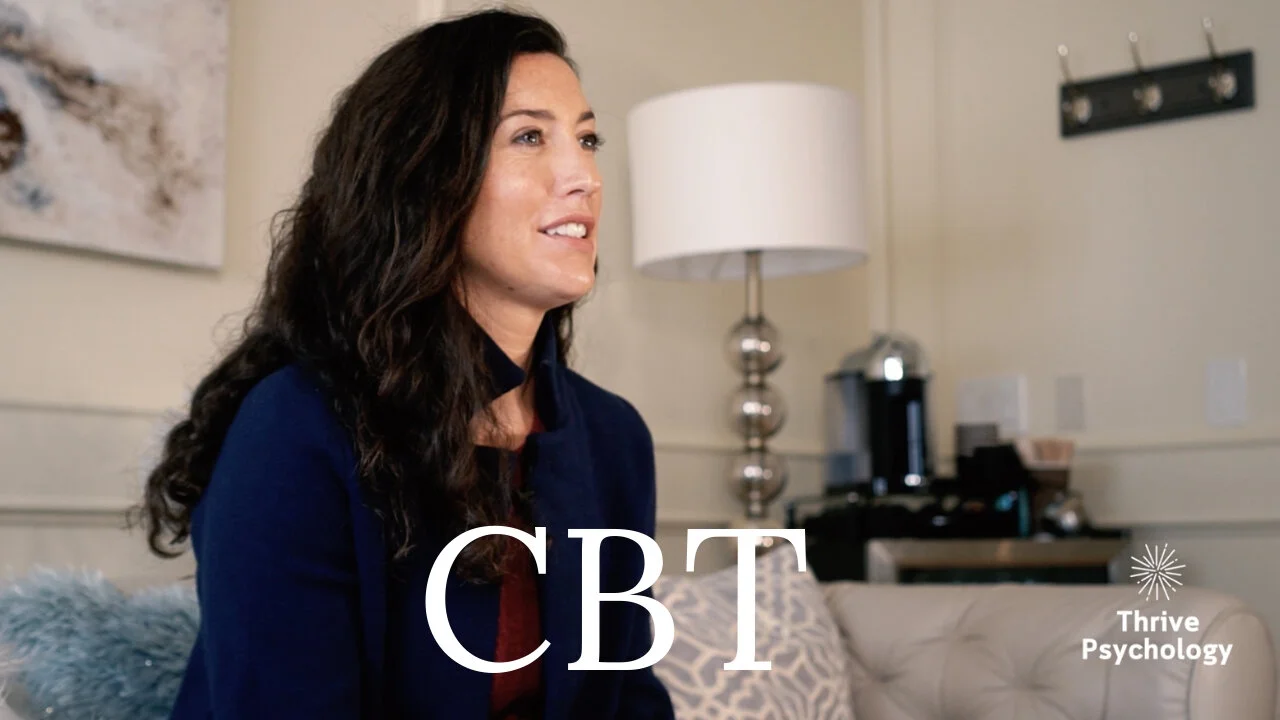
Cognitive Behavioral Therapy (CBT)
Cognitive behavioral therapy (CBT) is one of the best validated forms of therapy, and one of the core methods used at Thrive Psychology Group. CBT helps you become aware of inaccurate or negative thinking so you can view challenging situations more clearly and respond to them in a more effectively.
CBT can be a very helpful tool in treating mental health in instances of depression, post-traumatic stress disorder (PTSD) or eating disorders. It can also be an effective tool to help anyone to better manage stressful life situations.
Cognitive Behavioral Therapy in California | New York | Online in 40 States

WHAT IS CBT USED FOR?
CBT is used to treat a wide range of issues. It's often the preferred type of psychotherapy because it can quickly help you identify and cope with specific challenges.
CBT is a useful tool to address multiple emotional challenges and may help to:
Learn techniques for coping with stressful life situations
Identify ways to manage emotions
Resolve relationship conflicts and learn better ways to communicate
Cope with grief or loss
Overcome emotional trauma related to abuse or violence
Manage chronic physical symptoms
Mental health conditions that may improve with CBT include:
Sleep disorders
Sexual disorders
Depression
Bipolar disorders
Anxiety disorders
Phobias
Obsessive-compulsive disorder (OCD)
Eating disorders
Substance use disorders
PTSD
Who Is CBT Good For?
CBT is well-suited for anyone seeking practical and effective tools to address mental health challenges. It's particularly beneficial for individuals dealing with anxiety, depression, stress, or specific issues like phobias and trauma. Whether you're a child, adolescent, adult, or older individual, CBT's adaptable nature makes it a valuable resource. If you're looking for evidence-based strategies to reshape thought patterns, manage emotions, and foster positive change, CBT offers a tailored approach to enhance your mental well-being.

HOW CBT WORKS
Identify troubling situations or conditions in your life.
These may include such issues as a medical condition, divorce, grief, anger or symptoms of a mental illness. You and your therapist may spend some time deciding what problems and goals you want to focus on.
2. Become aware of your thoughts, emotions and beliefs about these problems.
Once you've identified the problems to work on, your therapist will encourage you to share your thoughts about them. This may include observing what you tell yourself about an experience (self-talk), your interpretation of the meaning of a situation, and your beliefs about yourself, other people and events. Your therapist may suggest that you keep a journal of your thoughts.
3. Identify negative or inaccurate thinking.
To help you recognize patterns of thinking and behavior that may be contributing to your problem, your therapist may ask you to pay attention to your physical, emotional and behavioral responses in different situations.
4. Reshape negative or inaccurate thinking.
Your therapist will likely encourage you to ask yourself whether your view of a situation is based on fact or on an inaccurate perception of what's going on. This step can be difficult. You may have long-standing ways of thinking about your life and yourself. With practice, helpful thinking and behavior patterns will become a habit and won't take as much effort.
WHAT HAPPENS DURING CBT?
Your Thrive therapist will encourage you to talk about your thoughts and feelings and what's troubling you. Don't worry if you find it hard to open up about your feelings. Your therapist can help you gain more confidence and comfort.
CBT generally focuses on specific problems, using a goal-oriented approach. As you go through the therapy process, your therapist may ask you to do "homework" — activities, reading or practices that build on what you learn during your regular therapy sessions — and encourage you to apply what you're learning in your daily life.
Your therapist's approach will depend on your particular situation and preferences. Your therapist may combine CBT with another therapeutic approach.
CBT RESULTS
Cognitive behavioral therapy may not cure your condition or make an unpleasant situation go away. But it can give you the power to cope with your situation in a healthy way and to feel better about yourself and your life.

CAN YOU DO CBT ONLINE?
Yes, Cognitive-Behavioral Therapy can be effectively conducted online. Many mental health professionals and therapists offer CBT through secure and confidential online platforms, making it accessible to individuals who prefer or require remote therapy. At Thrive, we offer CBT therapy online in 40+ states.
The principles and techniques of CBT can be adapted to online therapy sessions, allowing individuals to work on their emotional well-being, manage anxiety, depression, and other mental health concerns from the comfort of their own homes.
Online CBT sessions typically take place through video conferencing platforms, which enable real-time, face-to-face interaction with a qualified therapist. These sessions are private and secure, ensuring that the therapeutic process remains confidential and effective. Learn more about online therapy with Thrive.
Contact our Client Care Coordinator for a free 15-minute intake call to learn more.
COGNITIVE BEHAVIORAL THERAPY (CBT) FAQs
-
The success rate of Cognitive-Behavioral Therapy (CBT) varies based on individual factors and the nature of the issues being addressed. However, research consistently shows high success rates, with many individuals experiencing significant improvement in their symptoms. Success often depends on factors such as the client's commitment, the skill of the therapist, and the appropriateness of CBT for the specific concern.
-
Online CBT therapy has proven to be highly effective, offering convenience and accessibility. Numerous studies demonstrate comparable outcomes between traditional in-person CBT and online delivery. The effectiveness of online CBT depends on the quality of the platform, the skills of the therapist, and the suitability of the format for the individual's needs.
-
The duration of CBT varies depending on the individual and the complexity of the issues being addressed. Generally, CBT is considered a short-term therapy, often ranging from six to 20 sessions. The focus is on achieving specific, measurable goals within a practical timeframe. The therapist and client collaboratively determine the duration based on progress and individual needs.
-
CBT (Cognitive-Behavioral Therapy) and CPT (Cognitive Processing Therapy) are distinct therapeutic approaches. While both focus on cognition, CBT targets a broad range of issues by addressing thoughts, feelings, and behaviors. In contrast, CPT is specifically designed to treat trauma-related conditions, emphasizing the processing of traumatic events and the modification of associated beliefs. The choice between CBT and CPT depends on the nature of the client's concerns.
-
The cost of CBT at our group practice varies depending on factors such as location, therapist credentials, and session format (in-person or online). We encourage prospective clients to speak with our patient care coordinator to discuss fees. We prioritize making mental health services accessible, recognizing that the benefits of improved well-being through CBT can positively impact various aspects of life.









